Related Research Articles
Chess libraries are library collections of books and periodicals on the game of chess. In 1913, preeminent chess historian H. J. R. Murray estimated the total number of books, magazines, and newspaper columns pertaining to chess to be about 5,000 at that time. B. H. Wood estimated that number, as of 1949, to be about 20,000. David Hooper and Kenneth Whyld write that, "Since then there has been a steady increase year by year of the number of new chess publications. No one knows how many have been printed..."

Karl Ernst Adolf Anderssen was a German chess master. He won the great international tournaments of 1851 and 1862, but lost matches to Paul Morphy in 1858, and to Wilhelm Steinitz in 1866. Accordingly, he is generally regarded as having been the world's leading chess player from 1851 to 1858, and leading active player from 1862 to 1866, although the title of World Chess Champion did not yet exist.
Zugzwang is a situation found in chess and other turn-based games wherein one player is put at a disadvantage because of their obligation to make a move; a player is said to be "in zugzwang" when any legal move will worsen their position.

The Evergreen Game is a famous chess game won by Adolf Anderssen against Jean Dufresne in 1852.
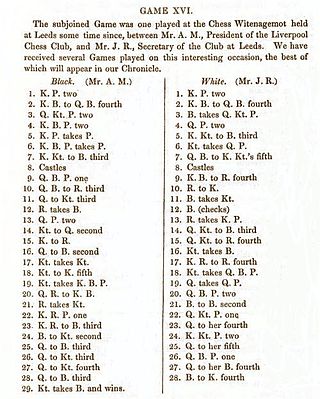
The Chess Player's Chronicle, founded by Howard Staunton and extant in 1841–56 and 1859–62, was the world's first successful English-language magazine devoted exclusively to chess. Various unrelated but identically or similarly named publications were published until 1902.

Tassilo, Baron von Heydebrand und der Lasa was a German chess master, chess historian and theoretician of the nineteenth century, a member of the Berlin Chess Club and a founder of the Berlin Chess School.

Robert Hübner is a German chess grandmaster, chess writer, and papyrologist. He was one of the world's leading players in the 1970s and early 1980s.
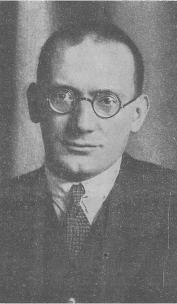
Ernst Franz Grünfeld was an Austrian chess player and writer, mainly on opening theory. He was among the inaugural recipients of the grandmaster title in 1950.
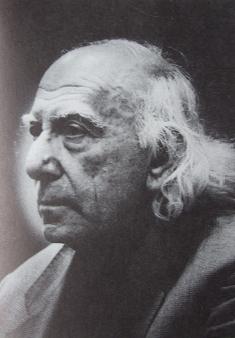
Harry Golombek OBE was a British chess player, chess author, and wartime codebreaker. He was three times British chess champion, in 1947, 1949, and 1955 and finished second in 1948.

Arthur John Roycroft is an English chess endgame study composer and author.
A History of Chess is a book written by H. J. R. Murray (1868–1955) and published in 1913.
Miksa (Max) Weisz was an Austrian chess player born in the Kingdom of Hungary.
James Macrae Aitken was a Scottish chess player. Aitken was born in Calderbank, Lanarkshire, Scotland. In 1938 he received a PhD from Edinburgh University on the topic of 'The Trial of George Buchanan Before the Lisbon Inquisition'.
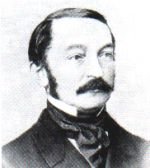
Dr Ludwig Erdmann Bledow was a German chess master and chess organizer . In 1846 he founded the first German chess magazine, Schachzeitung der Berliner Schachgesellschaft, which would later take the name Deutsche Schachzeitung.
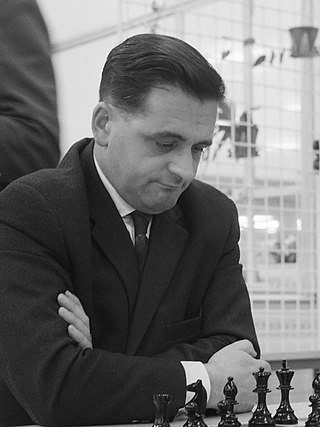
Rudolf Teschner was a German chess master and writer.
Reinhold Max Blümich (Bluemich) was a German chess master and editor.
Jacob Henry Sarratt was one of the top English chess players of the late 18th and early 19th centuries. Sarratt was renowned as a player and author and adopted the title "Professor of Chess". He was the first professional player to teach chess in England. He introduced into England the chess rule that a stalemate is a draw, which was commonly used on the continent of Europe. He coined with his works of 1813 and 1821 the term Muzio Gambit. He was a pupil of Verdoni and later the teacher of William Lewis and Peter Unger Williams.

André Chéron was a French chess player, endgame theorist, and a composer of endgame studies. He was named a FIDE International Master of Chess Composition in 1959, the first year the title was awarded.
Wiener Schachzeitung was the name of several Austrian chess periodicals published in Vienna between 1855 and 1949.
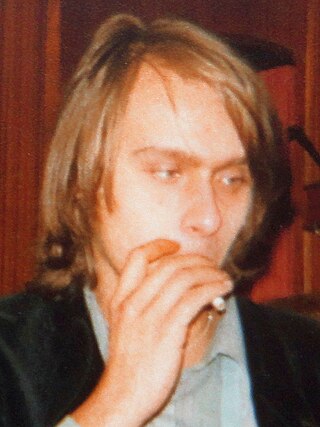
Ralf Lau is a German Chess Grandmaster.
References
- Deutsche Schachzeitung, ISSN 0012-0669
- Deutsche Schachzeitung archive at HathiTrust